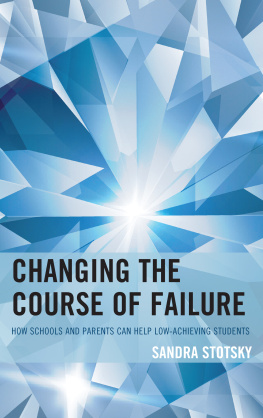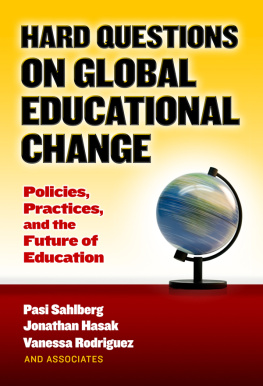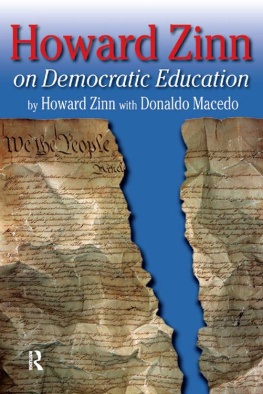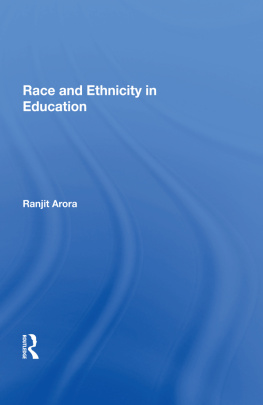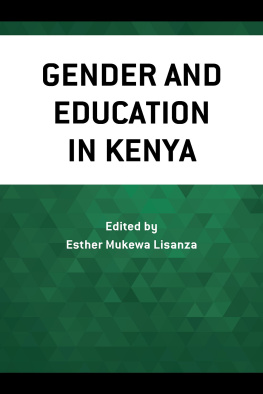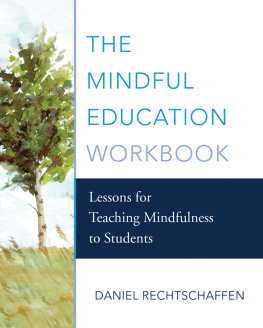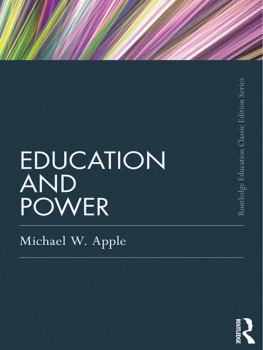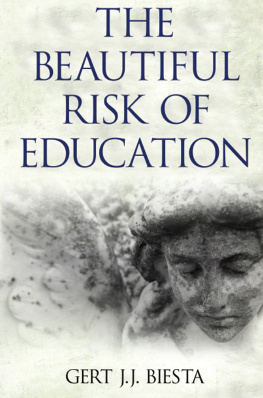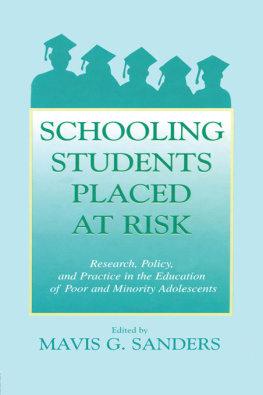Cover
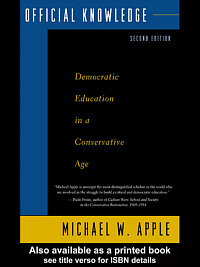
| title | : | Official Knowledge : Democratic Education in a Conservative Age |
| author | : | Apple, Michael W. |
| publisher | : | Taylor & Francis Routledge |
| isbn10 | asin | : | 0415907497 |
| print isbn13 | : | 9780415907491 |
| ebook isbn13 | : | 9780203901151 |
| language | : | English |
| subject | Education--Political aspects--United States, Critical pedagogy--United States, Education--United States--Philosophy, Education--Social aspects--United States. |
| publication date | : | 2000 |
| lcc | : | LC89.A815 2000eb |
| ddc | : | 306.43 |
| subject | : | Education--Political aspects--United States, Critical pedagogy--United States, Education--United States--Philosophy, Education--Social aspects--United States. |
Page i
OFFICIAL KNOWLEDGE
Page ii
This page intentionally left blank.
Page iii
OFFICIAL KNOWLEDGE
Democratic Education in a Conservative Age
SECOND EDITION
MICHAEL W. APPLE
ROUTLEDGE NEW YORK LONDON
Page iv
Published in 2000 by
Routledge
29 West 35th Street New York, NY 10001
This edition published in the Taylor & Francis e-Library, 2002.
Published in Great Britain by
Routledge
11 New Fetter Lane London EC4P 4EE
Copyright 2000, 1993 by Michael W. Apple.
All rights reserved. No part of this book may be reprinted or reproduced or utilized in
any form or by any electronic, mechanical or other means, now known or hereafter
invented, including photocopying and recording, or in any information storage or
retrieval system, without permission in writing from the publisher.
10 9 8 7 6 5 4 3 2
LIBRARY OF CONGRESS CATALOGING-IN-PUBLICATION DATA
Apple, Michael W.
Official knowledge: democratic education in a conservative age / Michael W. Apple.
p. cm.
Includes bibliographical references and index.
ISBN 0-203-90115-0 Master e-book ISBN
ISBN 0-203-90116-9 (OEB Format)
ISBN 0-415-90748-9ISBN 0-415-90749-7 (pbk.)
1. EducationPolitical aspectsUnited States. 2. Critical pedagogyUnited
States. 3. EducationUnited StatesPhilosophy. 4. EducationSocial aspects
United States. I. Title.
LC89.A815 1993 92-35829
370.1934dc20 CIP
British Library Cataloguing-in-Publication Data also available.
Designed by Cynthia Dunne
Page v
Contents
ACKNOWLEDGMENTS | VII |
PREFACE | XI |
1. | Introduction:The Politics of Official Knowledge | 1 |
2. | The Politics of Common-Sense:Why the Right Is Winning | 15 |
3. | Cultural Politics and the Text | 42 |
4. | Regulating Official Knowledge | 61 |
5. | Creating the Captive Audience: Channel Oneand the Political Economy of the Text | 89 |
6. | Whose Curriculum Is This Anyway?(with Susan Jungck) | 113 |
7. | Hey Man, Im Good: The Art and Politicsof Creating New Knowledge in Schools | 137 |
8. | The Politics of Pedagogy and the Buildingof Community | 145 |
Appendix:Education, Power, and Personal Biography: An Interview | 157 |
NOTES | |
BIBLIOGRAPHY | |
INDEX | |
Page vi
This page intentionally left blank.
Page vii
Acknowledgments
Official Knowledge is volume four of what has come to be called the Apple trilogy: Ideology and Curriculum, Education and Power, and Teachers and Texts. In a cute play on historical concepts, perhaps it should now be called the quadrivium, an idea that also concerned itselfas all these books have with the relationship between knowledge and power in education. Each volume has built on the ones preceding it, often correcting and extending arguments or striking out for new ground. Taken as a whole, they document my struggle (with the help of many others) to understand the limits and possibilities of democratic educational action.
The roots of these concerns go very far back, as I say in the interview with me published as an appendix to this book. Among the things that influenced me were the years I spent as a young teacher (I was only nineteen years old when I began) in the inner-city schools of one of the poorest cities in the United States. It was made strikingly clear to me then that unless we acted politicallyboth inside the school and in the larger societyto get less racist, sexist, and class-biased curricula, more critically oriented teaching practices, and closer relationships between schools and the local community, neither I nor my students and colleagues would have much of a chance of widespread success. Later on, when I became president of a teachers union, the structural nature of these problemsin our local, state, and national economic priorities, in our murderous health policies, in the sometimes conscious destruction of our cities, and so onbecame even clearer. My sense of the nature, sources, and complexity of the causes of the oppressive conditions so many people experience has grown; but one thing has not changed: the anger. If we cannot get angry at what this society is doing to its children, what can we get angry about?
Anger can of course make it difficult to concentrate. It can block ones ability to understand complex situations. On the other hand, it is a marvelous motivator to keep going, to try to get to the heart of the matter, in a time when critical educational work is under attack from the Right.
Page viii
I mentioned in the first paragraph that I have had help from many others. The list is very long and I am certain it could (and should) be longer. But I have a bad character flaw. I like to listen to people; I appreciate their criticisms of my efforts, even when it makes me uncomfortable. Our task is collective, and unless we respect others right to challenge us, we arent following through on the politics we supposedly hold.
Among the people who have taught me some important things about what I say in this book are: Petter Aasen, Alicia de Alba, Peter Apple, Madeleine Arnot, Shigeru Asanuma, Jim Beane, Basil Bernstein, Lanny Beyer, Nick Burbules, Kathleen Casey, Lourdes Chehaibar, Somphong Chi-tradub, Linda Christian-Smith, John Clarke, John Codd, Bob Connell, Roger Dale, Linda Darling-Hammond, Gabriela Delgados, Ann De Vaney, Patricia Ducoing, Liz Ellsworth, Mariano Enquita, Steven Fain, Paulo Freire, Edgar Gonzales, Liz Gordon, Beth Graue, Maxine Greene, Stuart Hall, Ove Haugalokken, Allen Hunter, David Hursh, Alison Jones, Didacus Jules, Susan Jungck, Harvey Kantor, Koji Kato, Jane Kenway, Ki Seok Kim, Herbert Kliebard, Colin Lankshear, Ann Lieberman, Dan Liston, Alan Lockwood, Allan Luke, Carmen Luke, Marisol Martinez, Cameron McCarthy, Peter McLaren, Sue Middleton, Isamu Mizutani, Akio Nagao, Susan Noffke, Jeannie Oakes, Michael Olneck, Bertha Orozco, Bu Kwon Park, Paige Porter, Gary Price, Adriana Puiggros, Fazal Rizvi, Leslie Roman, Judyth Sachs, Francis Schrag, Chris Searle, Steven Selden, Tomas Tadeu da Silva, Einar Skaalvik, Graham Smith, Linda Smith, Richard Smith, Jonas Soltis, Alfred Telhaug, Sumlee Thongthew, Carlos Torres, Bonnie Trudell, Lois Weis, Philip Wexler, Geoff Whitty, Paul Willis, and Kenneth Zeichner.
Next page

